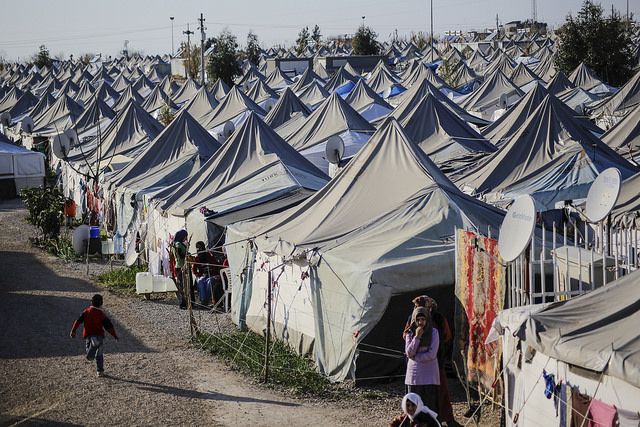My previous post discussed the rationale for the Commission’s revised MFF proposal put forward on 27 May 2020 which includes a proposal for a European Recovery Instrument (ERI) to finance front-loaded expenditure in the next MFF plus a slightly revised ‘standard’ MFF (which the Commission refers to as a ‘reinforced’ MFF). In broad terms, the reinforced MFF allows for commitment appropriations amounting to €1,100 billion over the 2021-2027 period, while the ERI would help to finance a further €750 billion of spending in the 2021-2024 period, in constant 2018 prices. Together, they add up to a total proposed spending of €1,850 billion over the MFF period.… Read the rest
Financing emergency aid to address market disruption due to COVID-19
There has been strong pressure on Commissioner Wojciechowski to get the Commission to do more to protect farmers and agricultural markets from the adverse effects of the lock-down responses to the coronavirus pandemic.
The Commissioner has argued that there is no funding available for these measures in the EU budget. In this post, I assess the funding that may be available to the Commissioner. I conclude that available funding is limited but not exhausted. It now seems time to make use of the crisis reserve that was put in place for exactly this eventuality as well as unused margins under the European Agricultural Guarantee Fund (EAGF) in the EU budget.… Read the rest
External convergence debate continues to simmer
One of the many issues that will need to be resolved when Heads of State and Government get around to once again considering the Multi-annual Financial Framework (MFF) 2021-2027 is what position to take on the external convergence of CAP direct payments.
The Commission has proposed a further narrowing of the differences in the average value of direct payments per hectare between Member States in the post-2020 CAP framework. For a number of countries from Central and Eastern Europe nothing less than full equality by the end of the MFF period will be acceptable. There is equally strong push-back from another group of Member States that argue there should be no further reductions in the CAP joint pillar allocations for the purpose of redistribution among Member States.… Read the rest
Climate mainstreaming the CAP in the EU budget: fact or fiction
Climate mainstreaming of the EU budget was introduced in the Commission’s Multiannual Financial Framework (MFF) proposal for the period 2014-2020 which first put forward the idea that “the optimal achievement of objectives in some policy areas – including climate action, environment, consumer policy, health and fundamental rights – depends on the mainstreaming of priorities into a range of instruments in other policy areas” (COM(2011)500). The Commission advocated in particular that the EU budget could play an important role in catalysing the specific investments needed to meet the EU’s climate targets and to ensure climate resilience.
The policy fiche on climate action in the Annex to the 2011 MFF proposal included the idea that the proportion of EU budget spending contributing to the EU’s transition to a low carbon and climate resilient society should be increased to at least 20%, subject to impact assessment evidence.… Read the rest
Commission assaults rural development spending to protect direct payments
Please note that the key chart in this post (the third chart, comparing the CAP ceiling in 2027 with that in 2020, has been updated using Commission figures in this post.
The Commission’s MFF proposal (including both ceilings for expenditure as well as ideas on how to finance the budget) was published yesterday. The Commission claims that the proposal includes reductions of roughly 5% in both the Common Agricultural Policy and Cohesion Policy programmes, as they have the largest financial envelopes. However, another way of looking at the numbers suggests that the cut is more like 15% overall in real terms over the period of the next MFF, but with a much bigger cut in Pillar 2 rural development expenditure of around 26%.… Read the rest
Why national co-financing of CAP Pillar 1 payments is needed in the MFF
There are few things that unite Agriculture Ministers more than their rejection of the idea of national co-financing of CAP Pillar 1 (P1) spending. In their first public discussion of the Commission’s November 2017 Communication of the future of the CAP post 2020 at the AGRIFISH Council meeting on 29 January, various agriculture Ministers, including France and Poland, explicitly made clear their opposition to national co-financing (as has Spain as reported here).
In early February, the Commission circulated a Communication ahead of the forthcoming European Council meeting on 23 February outlining the implications of different choices with respect to EU expenditure and financing in the forthcoming Multiannual Financial Framework (MFF).… Read the rest
Mr Oettinger’s budget arithmetic
Two events in the previous week give us a much clearer idea of what to expect for the CAP budget in the Commission’s proposal for the next Multiannual Financial Framework (MFF) at the end of May. Of course, the Commission’s proposal is only the start of the MFF negotiations. The MFF must ultimately be agreed unanimously by all Member States and (for the own resources decision) by their national parliaments, and also gain the approval of a majority in the European Parliament. Much can happen between the initial proposal and the final Council conclusions.
The two events in the previous week were Budget Commissioner Oettinger’s speech setting out his approach to the MFF proposal at a meeting in Brussels organised by the European Political Strategy Centre, the Commission’s in-house think tank, and his comments following the first presentation of his ideas to the Commission College.… Read the rest
Rethinking EU budget spending on agriculture in the next MFF
This post reproduces my key-note statement to the session More efficient use of scarce financial resources – An efficient Common Agriculture Policy and focussed structural Funds at the European Political Strategy Centre High Level Conference ‘Shaping our Future: Designing the next Multiannual Financial Framework’ which was held 8-9 January 2018 in Brussels. The delivered version was slightly abbreviated for time reasons.
The session was intended to reflect on more efficient use of scarce financial resources in the EU budget’s two largest spending categories – agricultural policy and structural funds. I expected my fellow panellists to have a lot to say about structural funds, so my presentation focused on agricultural policy.… Read the rest
Another look at the possible Brexit implications for the CAP budget
Preparations within the Commission for its next MFF proposal, which is now expected in May next year, are well under way. Thinking on the shape of the next MFF began in January last year with the Dutch Presidency Conference on preparing for the next MFF. In December 2016 the High Level Group on the Future Finances of the EU produced its final report and recommendations for a reform of the own resources side of the MFF. In June 2017, the Commission produced its Reflections Paper on the Future of EU Finances. This was one of a series of Reflection Papers published by the Commission in the wake of its White Paper on the Future of Europe published in March 2017.… Read the rest
Preparing for the MFF Mid-Term Review
The EU budget is under increasing pressure in the face of both new and unexpected expenditure demands. Already, in the first two years of this Multiannual Financial Framework (MFF) period 2014-2020, virtually all of the flexibility instruments which were put in place have been fully utilised, in part to fund the incoming Commission’s flagship project for a European Fund for Strategic Investments, and in part in response to the large number of arrivals of asylum-seekers, refugees and migrants as well as the terrorist attacks in Europe. In total, around €12 billion has so far been mobilised under the various flexibility instruments, leading one commentator to observe that “the EU budget had been flexed to the maximum”.… Read the rest






